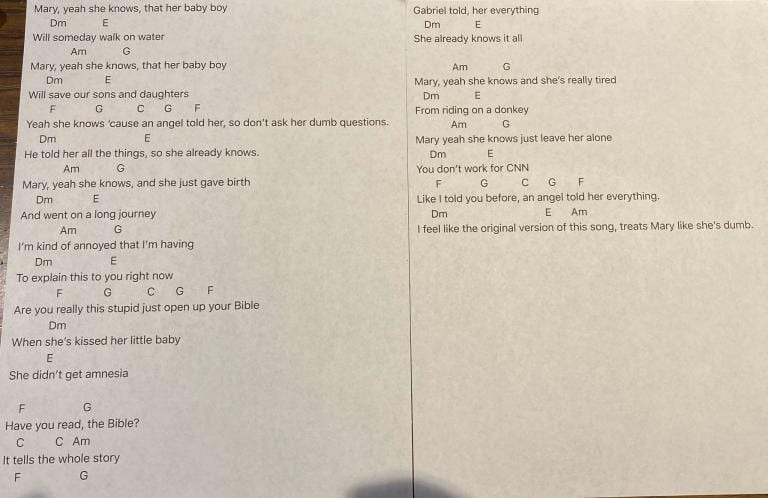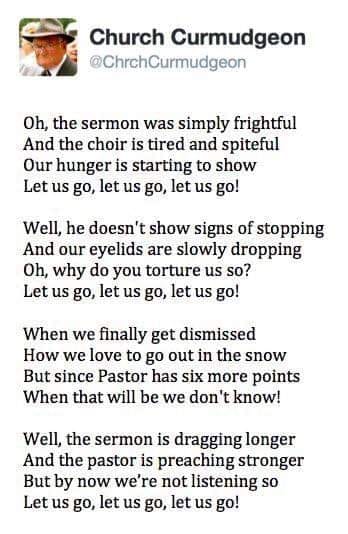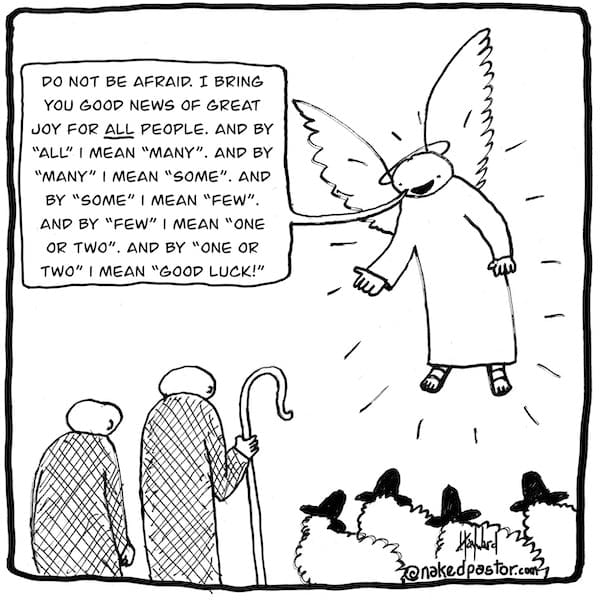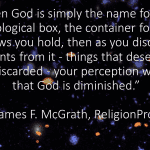Merry Christmas! A lot of people have pointed out the mansplaining of the songwriter in the song “Mary Did You Know?” Perhaps one of the funniest reworkings was this short one in a tweet:
Joseph: “Mary, did you -“
Gabriel: “No.”
(Matthew 1:19-21)
— Church Curmudgeon (@ChrchCurmudgeon) December 21, 2019
That seemed better (or at least shorter and more poignant and funny) than this attempt to “fix” the song, which didn’t seem to have made it better:

That was shared in response to the tweet by Church Curmudgeon, who also shared this Christmas song, rewritten in a way that I do think makes it funnier:

John Squires shares a couple of musical offerings: new lyrics to “Away in a Manger” for those who bristle at its docetic element, and a song called “Homoousion” to the tune of “Jingle Bells.” He also shared some posts that don’t relate to Christmas music, such as these:
https://johntsquires.com/2019/12/21/a-young-woman-a-virgin-pregnant-about-to-give-birth-isa-714-in-matt-123/
https://johntsquires.com/2019/12/17/now-the-birth-of-jesus-the-messiah-took-place-in-this-way-matthew-1/
Moving further away from music (unless the angels in this are also assumed to be singing), David Hayward made a cartoon that gets at an interpretive move that not only today’s conservative Christians, but most Christians down the ages, have made to at least some degree.

I’ve been listening to David Bentley Hart’s book That All Shall Be Saved as an audiobook while driving lately. It’s very good, but perhaps the most striking aspect so far, for me as a New Testament person, is the way he highlights the problems both in principle and in practice with ways that readers of New Testament texts have turned inclusive and universalist statements into restrictive and exclusivist ones. I’ve often said it is hard to notice what isn’t there in a text but we assume is. One example Hart highlights is that Paul never talks about a final eternal punishment of some group that is excluded from God’s desired restoration of all things. In 1 Corinthians 3 Paul talks about a judgments of the works of human beings, through which even those founding wanting are themselves saved after suffering loss. He mentions no third category, and it is pure assumption that this refers to judgment of Christians, with everyone else simply damned. If this intrigues you, and you got Amazon credit for Christmas, you might want to treat yourself to the book! If you buy things through links to Amazon on my blog, I make a very tiny sum of money while adding nothing to your cost. And so if you decide to do this, or click through and then buy yourself something else regardless of what it might be, you’ll be giving me a Christmas present as well!
Also related to that, Andrew Perriman discusses the consequences of saying the Aramaic word raca.
Getting back to Christmas, don’t miss the excerpts from the Infancy Gospel of James in Greek as well as translation on the Sententiae Antiquae blog, such as this one:
Travel Plans for the Holidays: On to Bethlehem with the Protoevangelium of James
The Patrologist has one from Chrysostom.
Richard Beck says that everything he learned about Christmas he learned from television.
From Allan Bevere: posts on Mary, Joseph, and Elizabeth, as well as a video with N. T. Wright.
Finally, let me share a Christmas sci-fi classic that brings us back to where this post started, but weaving in the theme of redemption rather than eternal torment of the wicked that we somehow found our way to. “The circle is complete.” Merry Christmas, and may the Force be with you!














